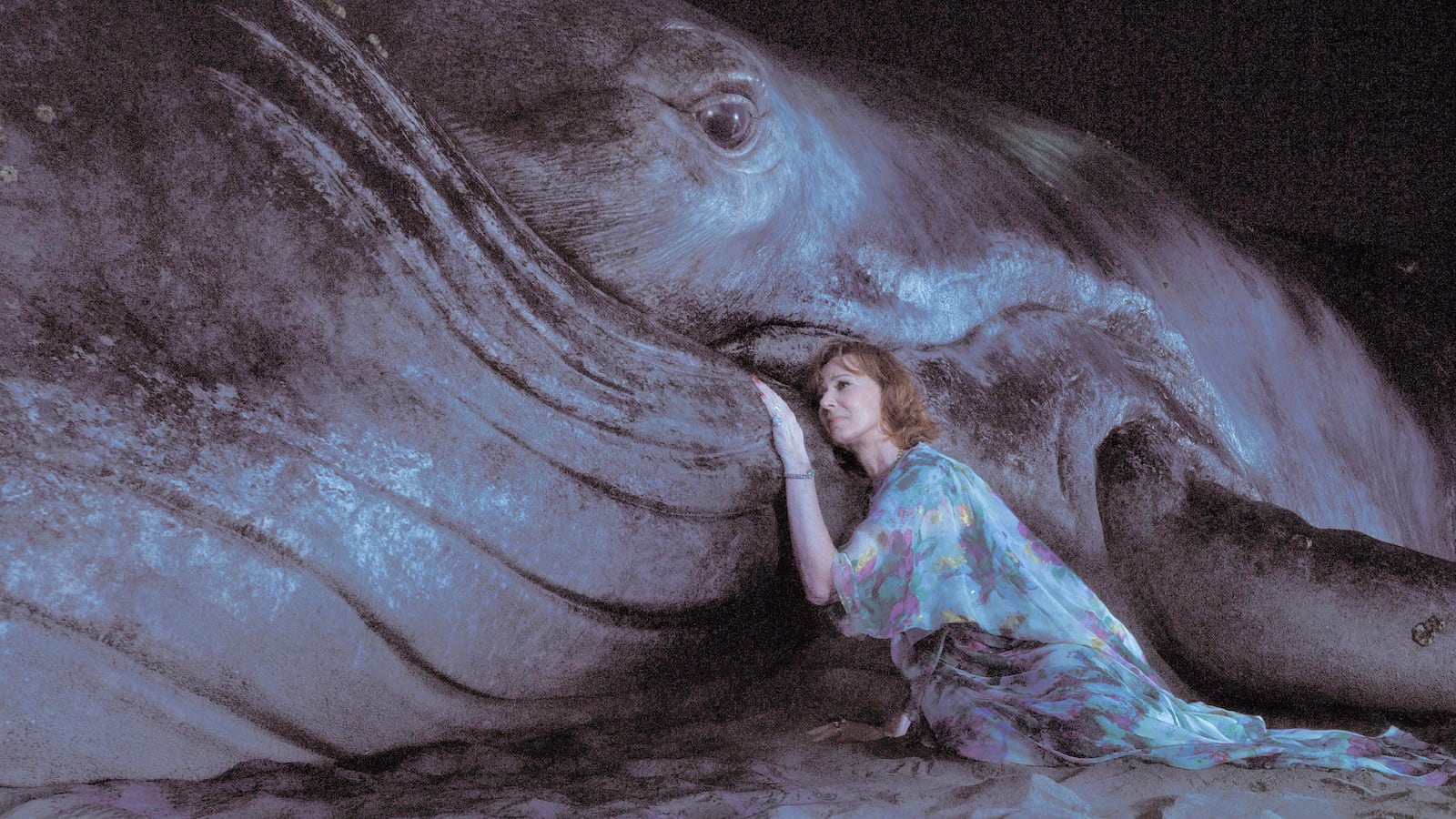The first season of Palm Royale–the Apple TV+ series set in Palm Beach, 1969—has been nothing if not idiosyncratic, a synthesis of meditations on second and even third acts in American life, examinations of power and gender dynamics among the super-rich, and a whole lot of sunny-hued fun—almost always cranked up to 11 and all filtered through a queer lens. This is a show that featured a 15-minute rumba set piece earlier in the season, so the audience knew coming into the series’ eighth episode, “Maxine Saves A Whale,” that Palm Royale doesn’t simply go for big swings, it relishes them.
Still, nothing could have prepared us for the sudden spectacle of an actual humpback whale beaching itself just outside the Dellacorte mansion, or for the profound self-reflection it prompts in three characters in particular: Maxine Dellacorte (Kristen Wiig), Evelyn Rollins (Allison Janney), and Robert Díaz (Ricky Martin). Yes, in this episode, Allison Janney has her most emotional acting scene of the series, tearfully pouring out Evelyn’s bruised heart to a giant, dying whale.
As wild as the whale’s surprise appearance is, series creator and showrunner Abe Sylvia describes it as inevitable, the “objective correlative” to his ensemble’s individual and collective character arcs, and a necessary shove forward along their journeys through what they all interpret as “some kind of karma comeuppance.” He fondly refers to Palm Royale as “a gay fantasia” that is also a drama built atop a rich seam of melancholy its characters must mine to navigate their own personal reckonings.
For Sylvia, the series’ eighth episode was the moment to take “a tremendous swing” in pursuit of Palm Royale’s mission to be “light fare that seeks to delight” while locating the nexus of its many plot threads. Even a madcap farce needs to be grounded in reality, lest it spin off into just so much narrative cotton candy. As our high society strivers hurtle towards the series’ final two episodes, what better mechanism to prompt karmic examinations of their life choices than an inconveniently and perhaps mystically self-beaching whale? Series mastermind Sylvia chatted with The Daily Beast’s Obsessed to reflect on the grit behind his Palm Beach’s glamor, the challenges of pursuing a fully authentic life, and what makes Allison Janney's and Ricky Martin’s performances so extraordinary.

Ricky Martin and Kristen Wiig
Apple TV+Funnily enough, the idea for a massive cetacean deus ex machina came from reality. “As we were developing this episode,” Sylvia recalls, “whales were washing up on shores around the world, and nobody knew why. I always think when these unexplained natural phenomena happen, it’s because people are doing something to the world that they are not taking responsibility for.”
That suited the theme of an episode rooted in character development and turning points. The whale’s arrival prompts existential crises for Maxine, Robert, and Evelyn; each must dig deep to reconnect with long-buried aspects of their most essential selves. It’s an acknowledgment that whether they stay in Palm Beach and manifest their dream existences or find themselves caught out and booted from its Edenic (yet poisonous) confines, they’ll still be whoever they fundamentally are, wherever they land.
Through these confrontations, “Maxine Saves A Whale” highlights the consequences of the long-term playacting Maxine, Robert, and Evelyn have been doing, typecasting themselves into very narrow roles to get the lives they want. It’s not coincidental that not one of this trio is from old money. Their inability to control and fully benefit from the wealth they’re adjacent to makes their social positions quite precarious, and their actions occasionally desperate.
Maxine is the most immediately affected; if that whale doesn’t scooch its way back into the open ocean, its rotting corpse will make hosting the all-essential Beach Ball impossible. She professes not to believe in karma, but is decent enough to know that Robert is going to learn sooner or later that she sacrificed his romance with the con artist pretending to be Luxembourgian royalty in order to save her husband Douglas (Josh Lucas) from prosecution by the FBI. Within “that budding friendship, there’s a chasm now,” Sylvia says, making it more promising and more fragile than ever before. Long accustomed to dancing backwards, in heels, to get where she’s going, Maxine has now added entire place settings to the plates she’s been twirling all along.
Robert, ignorant of Maxine’s betrayal and leaning on her for sympathy, has been shielding himself against both heartbreak and persecution for the last 20 years by remaining a closeted gay man, but can he really continue down that path now that he’s had a glimpse of what his life could be with the right guy?
While both Maxine and viewers wait for the other shoe to drop, poor Robert blames himself for the fake prince’s downfall, sublimating his accumulated longing, grief, and shame into haunting trumpet solos. He’s been happy enough living in the Dellacorte estate’s pool house for years, perhaps, as part of the arrangements of his relationship with Norma. Sylvia notes that the dynamic between Robert and Norma is rooted in a long-established social tradition of “gay men worship the tenacity and fierceness of the older women, and the women love the adoration of a younger, good-looking guy without the threat of sex” that could destabilize their friendship. Given that “there’s a connection between sex and longing and death for Robert,” and the near-guaranteed social and legal repercussions that coming out would have for him, up until now, relinquishing the comfort of his life in the pool house was unthinkable. But what if?
Ricky Martin’s restrained, heartfelt performance as the guarded and caring Robert has been a revelation. In his hands, the character has been fully three-dimensional from his first scene, something Sylvia has marveled over since casting him: “We ran towards these essential qualities that this beautiful actor was bringing to the set every day… he’s the straight man in the show.” In an ensemble of divas all the way down, Martin’s soulful approach provided “the exact counterpoint we needed for all of the zaniness going on” in the story.

Ricky Martin
Apple TV+Outside of the Dellacorte household, Evelyn Rollins (Janney) has been brought low by the news that her late husband Skeet (Bruce Dern) cut her almost entirely out of his will, leaving most of his millions to his daughter Linda (Laura Dern). After decades of relishing her status as a wealthy and powerful society wife, Evelyn is staring down the possibility of becoming a commoner once more, consigned to exile in a trailer park in a Florida town nobody’s ever heard of. In that moment of crisis, Sylvia says, “the whale washing up on shore touches something in her that gets her back to her essential self, talking about her childhood, and about being a showgirl” before becoming Mrs. Skeet Rollins. Marrying into wealth was not the eternal insurance policy she anticipated it would be.
Sylvia’s praise for Janney’s performance is both lavish and justified, describing her as “magical in this episode.” He adds: “She truly is a sorceress in terms of what she is able to do emotionally with an audience” because “she’s able to play truth and style in equal measure.” Palm Royale is most effective when it gives the audience glimpses of what lies behind the veneer of gaiety and the decades’ worth of dreams deferred that are required to prop up that image.
In the end, Maxine coaxes the whale back where it belongs, offering a nakedly apologetic serenade—in whalesong, of course—from the deck of a yacht. It’s silly and improbable, but in another showcase for Wiig’s versatility, she sells it. There are no sly, knowing winks here, just sincerity and a kind of promise to do right by the people Maxine cares about, and by her true self, too. Let’s hope she keeps it.






